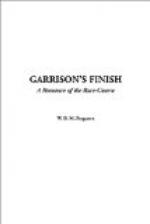The colonel, swollen with the winning of the Carter Handicap, had conceived the idea that he was possessor of a God-given knowledge of the “game.” And there had been many to sustain that belief. Now, the colonel might know a horse, but he did not know the law of averages, of chance, nor did he even know how his fellow man’s heart is fashioned. Nor that track fortunes are only made by bookies or exceptionally wealthy or brainy owners; that a plunger comes out on top once in a million times. That the track, to live, must bleed “suckers” by the thousand, and that he, Colonel Desha, was one of the bled.
He was on the wrong side of the table. The Metropolitan, Brooklyn, Suburban, Brighton, Futurity, and a few minor meets served to swamp the colonel. What Waterbury had to do with the case was not clear. The colonel had taken his advice time and time again only to lose. But the Kentucky estate had been sold, and Mr. Waterbury held the mortgage of the Desha home. And then, his mind emptied of its poison, the colonel slowly came to himself.
“What—what have I been saying?” he cried tensely. He attempted a laugh, a denial; caught his daughter’s eyes, looked into them, and then buried his face in his quivering hands.
Sue knelt down and raised his head.
“Daddy, is that—all?” she asked steadily.
He did not answer. Then, man as he was, the blood came sweeping to face and neck.
“I mean,” added the girl quietly, her eyes, steady but very kind, holding his, “I had word from the National this morning saying that our account, the—the balance, was overdrawn—”
“Yes—I drew against it,” whispered Colonel Desha. He would not meet her eyes; he who had looked every man in the face. The fire caught him again. “I had to, girlie, I had to,” he cried over and over again. “I intended telling you. We’ll make it up a hundred times over. It was my only chance. It’s all up on the books—up on The Rogue. He’ll win the Carter as sure as there’s a God in heaven. It’s a ten-thousand stake, and I’ve had twenty on him—the balance—your balance, girlie. I can pay off Waterbury—” The fire died away as quickly. Somehow in the stillness of the room, against the look in the girl’s eyes, words seemed so pitifully futile, so blatant, so utterly trivial.
Sue’s face was averted, eyes on floor, hands tensely clasping those of her father. Absolute stillness held the room. The colonel was staring at the girl’s bent head.
“It’s—it’s all right, girlie. All right, don’t fret,” he murmured thickly. “The Rogue will win—bound to win. You don’t understand—you’re only a girl—only a child——”
“Of course, Daddy,” agreed Sue slowly, wide-eyed. “I’m only a child. I don’t understand.”
But she understood more than her father. She was thinking of Billy Garrison.
CHAPTER IX.
A breath of the old life.




